Manifesto
ATELIER SOIL is an architecture and urban planning practice committed to an ecological and inclusive transition of spaces.
As architects of territorial transformation, we are convinced that soil is a pillar of development and the raw material of environmental transition. It is a vital resource and a heritage to be preserved. We place soil at the heart of the design of public spaces and territorial strategies that we develop.
Our goal: to develop territories and create attractive places and landscapes for everyone, which adapt to global warming, promote biodiversity, guarantee accessibility for all, and produce resources for their environment (water, energy, materials, food, etc.).
We operate in all areas and on all scales, implementing a regenerative urbanism that intensifies the potential of each m², broadens its temporality of use and transforms without extending the city.
At the interface between public and private players, we adopt an approach that is both sensitive and technical, supported by a large group of specialists and privileged partners. Our projects reflect our commitment to feasibility, impact and sustainability.
Because each m² matters.
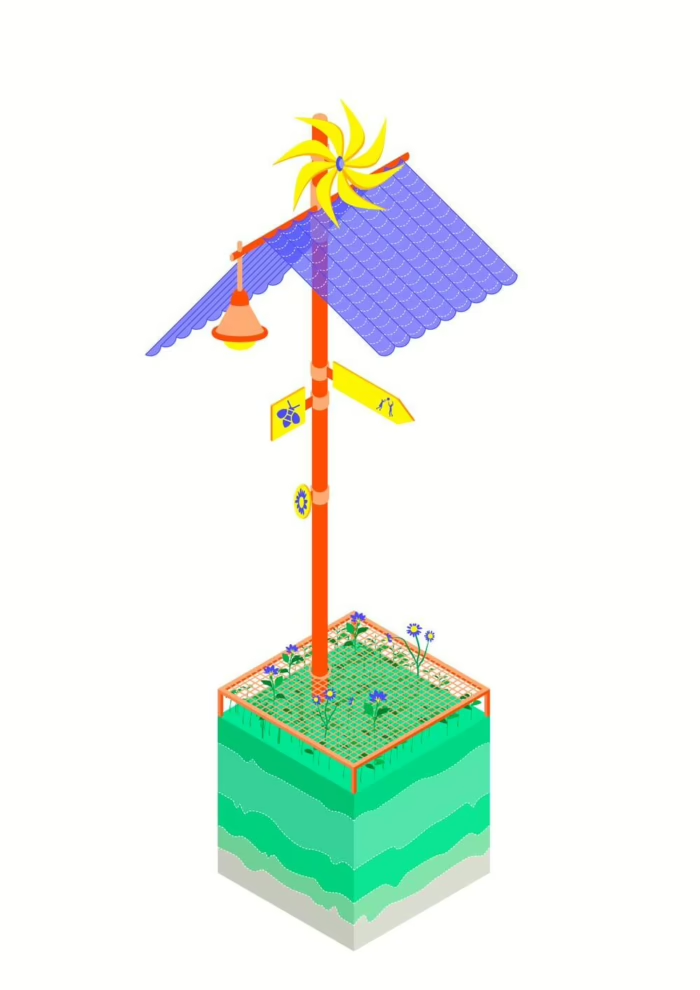
Révéler la valeur de chaque m²
Une nouvelle unité de mesure, dénominateur commun pour tous les acteurs du projet urbain
Selon que l'on s'adresse à un acteur public ou privé, à un maître d'ouvrage ou un maître d’œuvre, à un aménageur ou encore à un propriétaire, la valeur d'un m² n'est pas toujours abordée sous le même angle.
Atelier Soil travaille à la prise en compte de toutes les valeurs d'un m² dans le projet urbain :
climatique et environnementale, sociale et patrimoniale, d'usage, économique, foncière, etc. Notre travail se base ainsi sur une lecture fine du potentiel de chaque m² comme moteur de projet.

Préparer demain, dès aujourd'hui
Adaptation, atténuation : agir face aux crises environnementales et sociales
Nous affrontons aujourd’hui une situation d’urgence marquée par des crises environnementales et sociales majeures. Dans ce contexte, nous envisageons notre pratique comme une véritable opportunité : celle d’engager des transformations profondes afin de maintenir l'habitabilité de nos territoires.
Répondre à l'urgence ne signifie pas agir précipitamment, au coup par coup : nous défendons une approche réfléchie et agile du projet urbain, qui s'adresse aux situations existantes mais aussi au long terme.
Nous développons des dispositifs d'adaptation mais aussi d'atténuation : chacune de nos interventions devient ainsi l'occasion de faire de la transition environnementale un mouvement positif, porteur de nouveaux modes d'habiter, de travailler, de se ressourcer ou encore d'échanger.
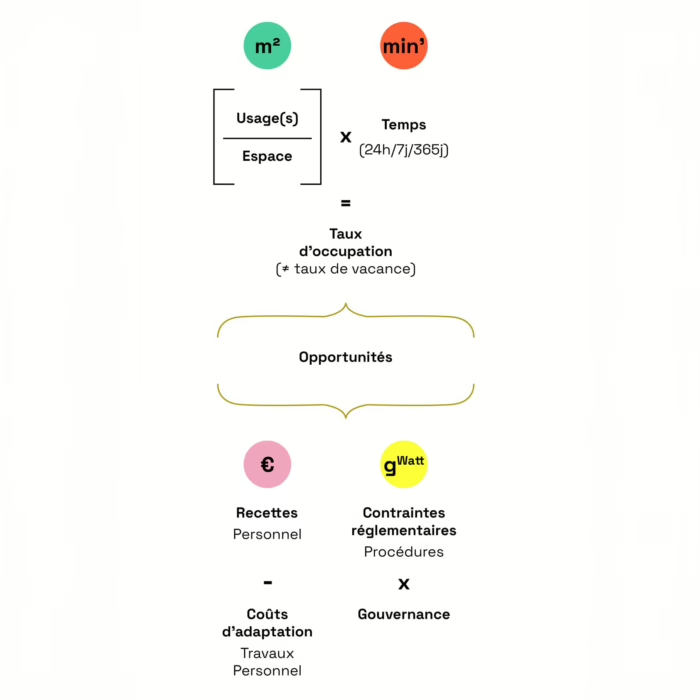
Trouver la juste équation
Petites interventions, grands impacts
Prioriser, hiérarchiser, maximiser les co-bénéfices... tout en atteignant un haut niveau de performances environnementales et sociales. Autant d'enjeux pour la décarbonation des territoires qui se heurtent au contexte général de diminution de moyens et de ressources (humaines et matérielles).
Pour adresser cette situation, Atelier Soil adopte une approche ambitieuse mais réaliste du projet urbain. Bien dimensionner, optimiser, rationaliser, intensifier, faire moins parfois ; Intensité d'usages, mutualisation, superposition, chronotopie... Nous considérons tous les leviers d'ajustement pour répondre à chaque situation avec le plus de justesse possible sans renoncer à la qualité.
Nous adoptons une posture d'humilité face à la complexité des sites pour lesquels nous sommes sollicités : notre approche est celle du « sur mesure », dans un aller-retour constant entre ambitions et réalités de terrain, entre performance et sobriété.
Angles d'attaque
Nous revendiquons une approche à la fois technique et sensible, qui vise à trouver le meilleur équilibre entre contraintes économiques, matérielles et réglementaires et respect des besoins des usagers, jusqu'aux plus vulnérables.
Nous abordons les projets à travers trois grands paramètres de projet qui constituent à nos yeux le socle d'une opération viable et impactante : les flux, les usages et le climat.
Flux
Mobilité, accessibilité
Nos espaces de vie sont desservis et traversés par des flux aux impacts variés en termes de vitesse, de chronotopie et d’emprise spatiale et carbonée.
Afin d’assurer la cohabitation apaisée et sécurisée de l’ensemble de ces modes, nous travaillons sur la capacité de chaque lieu à offrir les conditions nécessaires à l’autonomie et à la mise en mouvement de ses usagers.
Usages
Programmation, universalité et intensité
L’espace public, lieu du lien social, est par définition un endroit de partage et de négociation.
Afin de répondre aux besoins de toute la
« biodiversité des publics » sans distinction d’âge, d’origine ni de genre, chaque usage doit être programmé et dimensionné avec justesse. Nous accompagnons ainsi chaque projet en veillant à réunir toutes les conditions d’équipement pour assurer la meilleure appropriation par ses usagers.
Climat
Résilience, eau, et biodiversité
À l’heure de la crise climatique, la capacité d’un site à résister et à s’adapter aux chocs et aux dérèglements environnementaux doit guider la conception de chaque projet d’aménagement.
Nous travaillons à faire de l’urbanisme un vecteur de régénération des territoires, afin d’offrir à ses habitants des lieux de refuge et de ressourcement favorables à la santé.
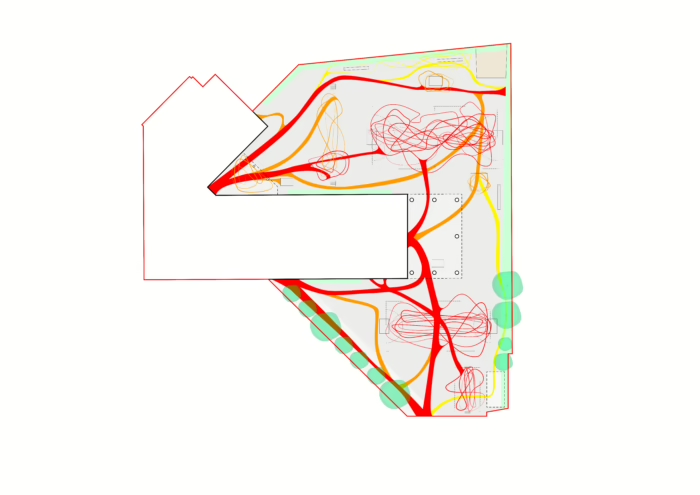
Flux
Mobilité, accessibilité
Nos espaces de vie sont desservis et traversés par des flux aux impacts variés en termes de vitesse, de chronotopie et d’emprise spatiale et carbonée.
Afin d’assurer la cohabitation apaisée et sécurisée de l’ensemble de ces modes, nous travaillons sur la capacité de chaque lieu à offrir les conditions nécessaires à l’autonomie et à la mise en mouvement de ses usagers.
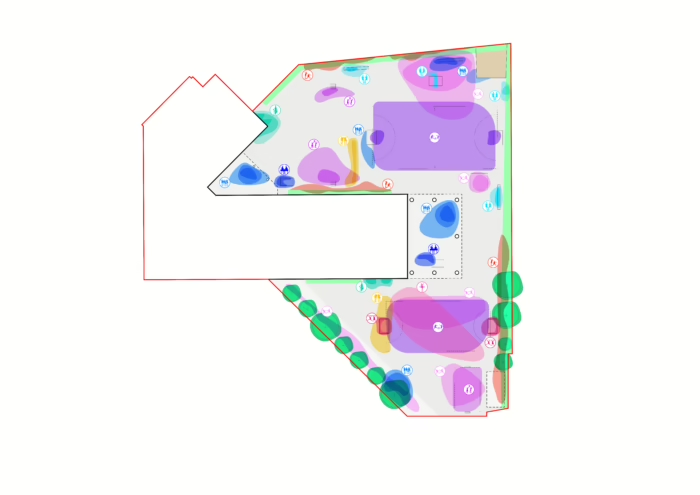
Usages
Programmation, universalité et intensité
L’espace public, lieu de la fabrique du lien social, est par définition un endroit de partage et de négociation.
Afin de répondre aux besoins de toute la « biodiversité des publics » sans distinction d’âge, d’origine ni de genre, chaque usage doit être programmé et dimensionné avec justesse. Nous accompagnons ainsi chaque projet en veillant à réunir toutes les conditions d’équipement pour assurer la meilleure appropriation par ses usagers.
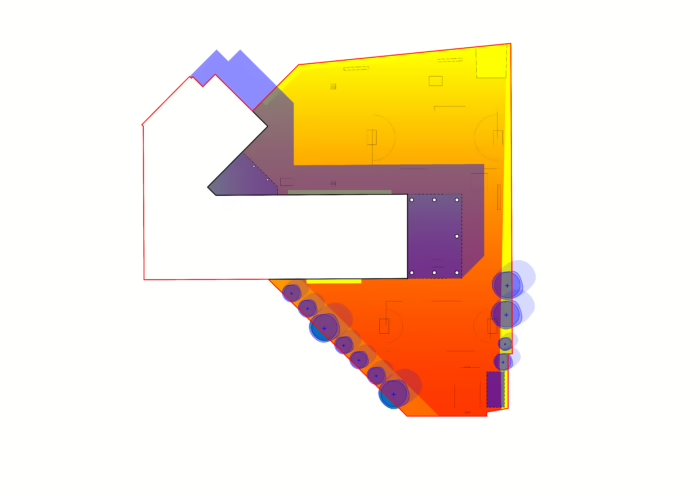
Climat
Résilience, eau, et biodiversité
À l’heure de la crise climatique, la capacité d’un site à résister et à s’adapter aux chocs et aux dérèglements environnementaux doit guider la conception de chaque projet d’aménagement.
Nous travaillons à faire de l’urbanisme un vecteur de régénération des territoires, afin d’offrir à ses habitants des lieux de refuge et de ressourcement favorables à la santé.

